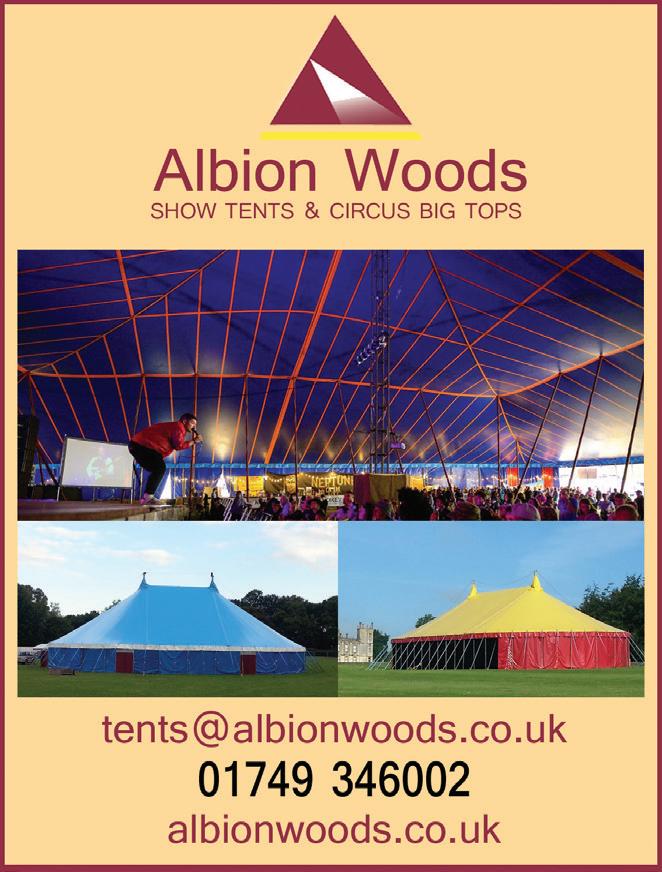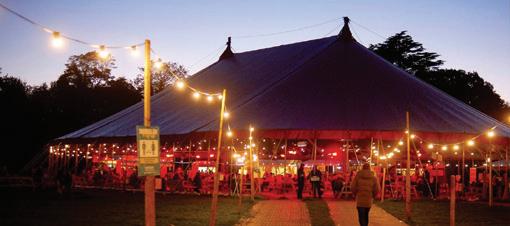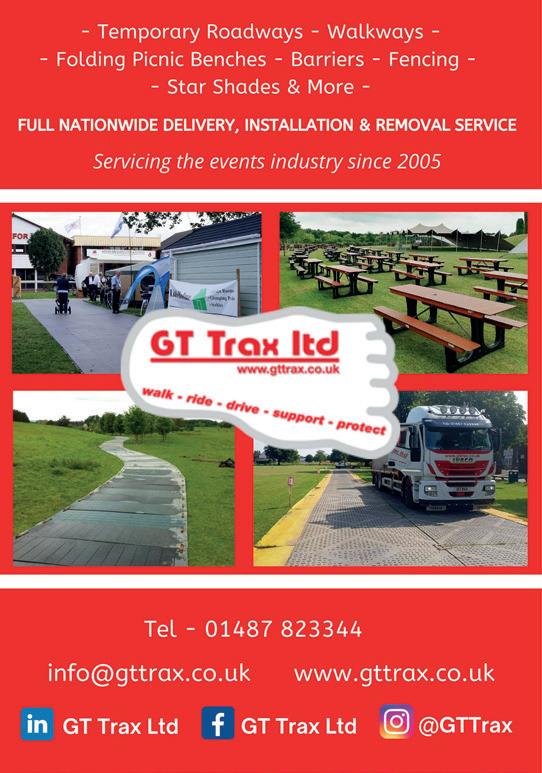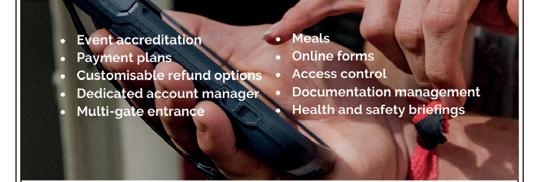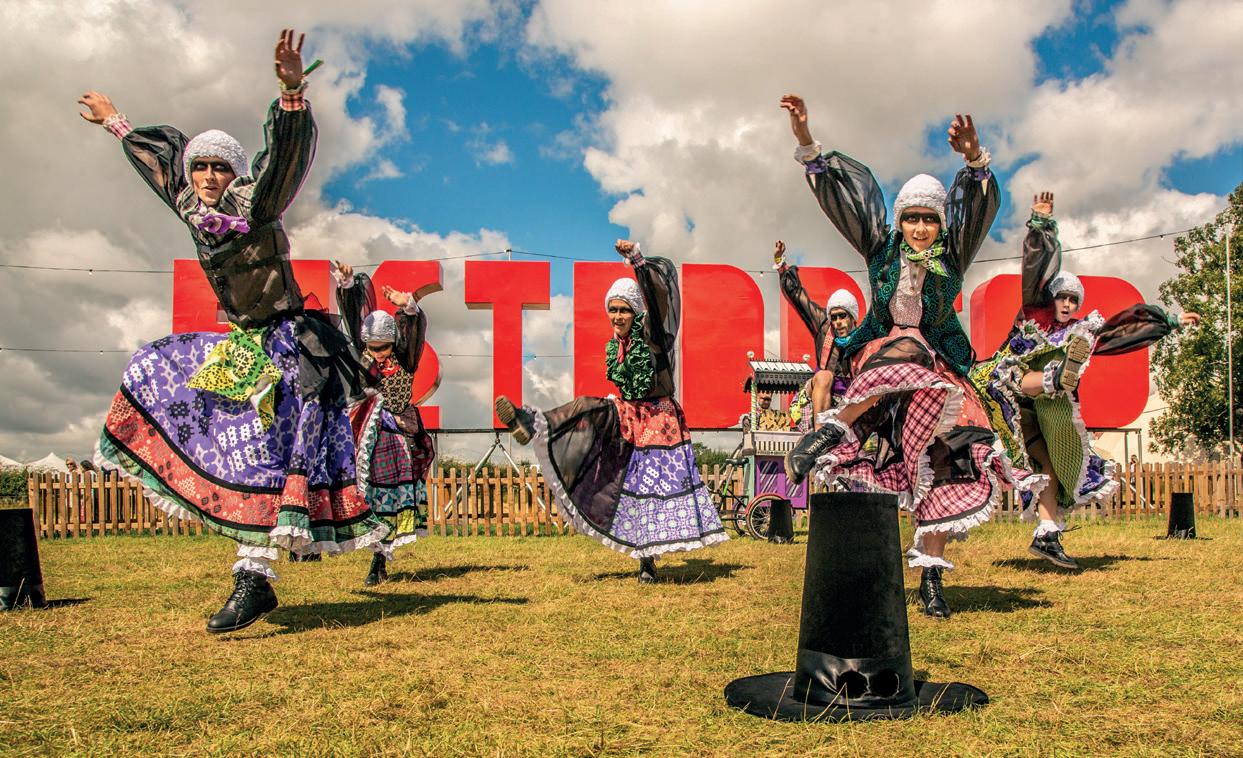
14 minute read
NATIONAL TREASURE
NATIONAL EISTEDDFOD RETURNED
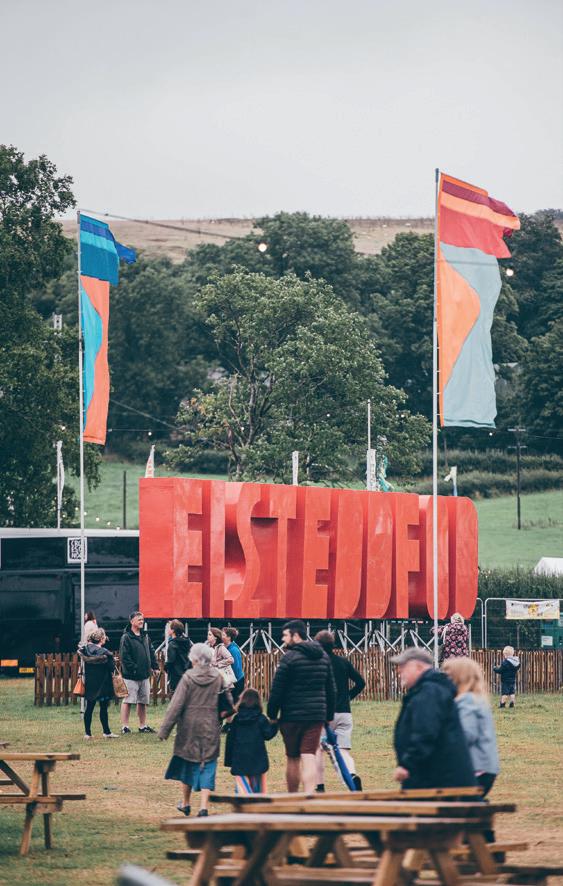
All eyes on Eisteddfod
How does a festival successfully blend tradition and modern culture? National Eisteddfod’s Betsan Moses and 2Can Production’s Matt Davies discuss the challenges, changes, and successes of National Eisteddfod 2022
Held during the first week of August each year, the National Eisteddfod is a celebration of the culture and language in Wales. The large-scale festival travels from place to place, alternating each year between north and south Wales, attracting around 150,000 visitors and more than 250 traders and stalls.
Traditionally a competitionbased festival, attracting more than 6,000 competitors skilled in poetry, dance, music, and art, the festival has developed and evolved, and whilst the competitions form the central focus for the week, the Maes (site) itself has grown and developed into a vibrant festival with hundreds of events and activities for the whole family.
The 2022 edition of the festival was no different. It was important that the National Eisteddfod came back with a bang. The annual festival had not taken place in a live/physical setting since 2019.
Betsan Moses, chief executive of Eisteddfod, took a break from paying bills and invoices to talk to StandOut about this year’s outing in Tregaron, Ceredigion. She explained: “After two dormant years, we wanted a celebration. We began the Eisteddfod with traditional Welsh hymn singing before inviting people to join a lantern procession that led to a big circus performance.”
It was the first time that National Eisteddfod had produced a large event to “open” the eightday festival. The circus show was supposed to have taken place on two nights, but rain stopped play on the first evening.
“Eisteddfod is a safe place to uncover the alternative,” she continued. “We have never featured such a show before but moving forward, we will definitely develop the programme.
“Eisteddfod is continually changing because it’s important to push boundaries, but how do you ensure that you develop? We must provide people with the opportunity to experience modern Welsh language culture.”
The organising team opted to cap ticket prices at £20 so that visitors could experience Welsh language culture for a reasonable price.
“We’ve seen a huge surge in costs since 2019, with the price of everything, from fuel to inflation and from materials to buildings rising dramatically,” Moses continued. “We know it’s a difficult time for everyone, so we kept our ticket prices the same as the Conwy County Eisteddfod back in 2019. We believe that everyone should be able to access Welsh language and culture, but then how do we tally that as an organisation. We are a business, but if you want to put on something exceptional, there’s a cost.”
DEVELOPMENT AND COMMUNICATION
For the first time, visitors could print Maes tickets from home or use their smartphone to enter the site. This was part of a new sustainability strategy, which saw the Eisteddfod pioneering sustainable event practices whilst conducting a sustainability audit. But that was not the only change. A new online artist liaison and accreditation process was implemented and will be further embedded in the future.
Moses added: “We have 1,000 events on site, and we have more competitions than Urdd Eisteddfod. Plus, we have satellite events. We had to think: ‘How do we communicate effectively and not duplicate tasks or information?’ and we wanted a way to reduce the potential for making mistakes.
“We also had to think about how we developed our website and how we could use it more effectively. For example, within the backend, how could we make life easier for ourselves? Also, how could we incorporate what we learned during those two years of a digital Eisteddfod? What were and indeed, what are the needs of a modern festival? It was a massive piece of work and cracking that was huge.”
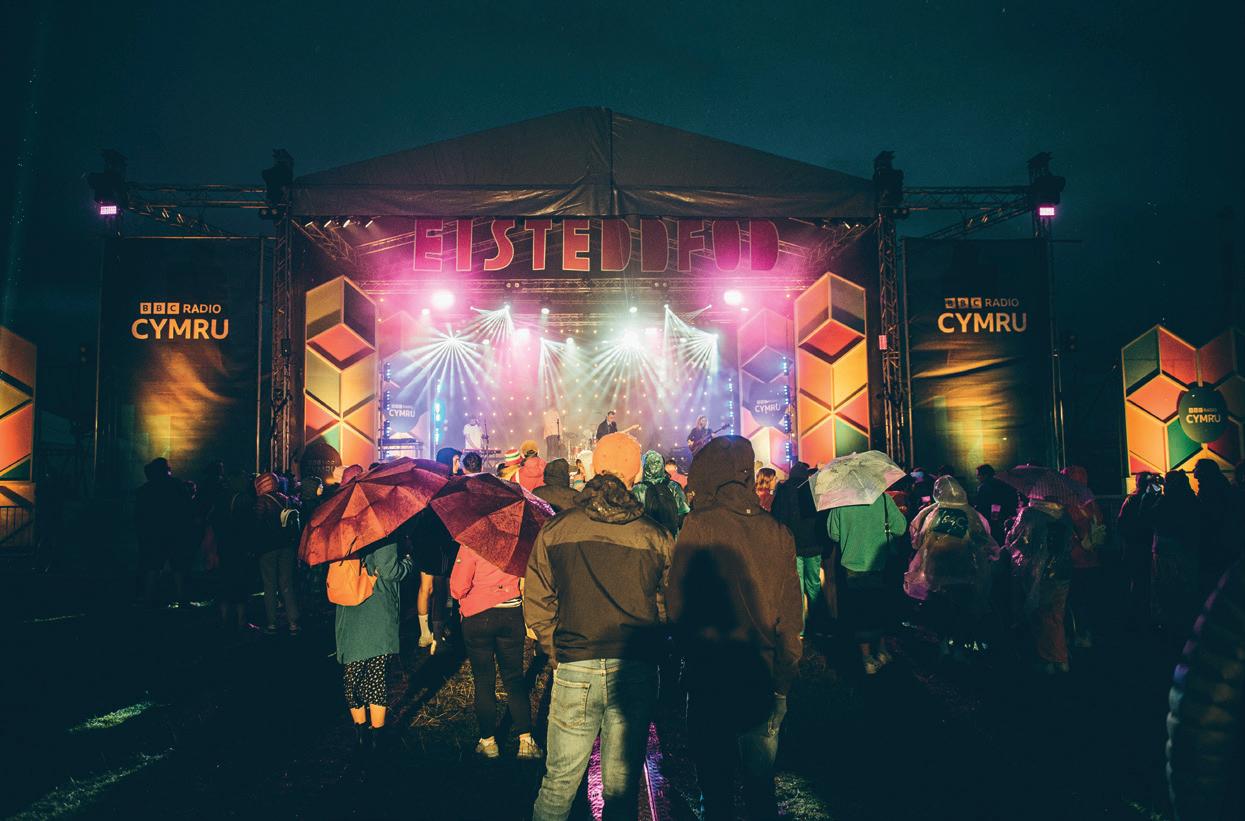
DELIVERY AND OPERATIONS
According to Moses, if you work on a festival, you don’t have a job title, you just do what’s needed. During the event, she got stuck in, addressing challenges. For example, 10 days prior to the festival opening its gates, the event’s big top provider pulled out. Five hours later, three big tops had been sourced, each for an almost three-week hire period. It was not an easy task, but one that Matt Davies, director of 2Can Productions, was charged with sorting out.
In 2019, 2Can won a three-year contract to procure suppliers, deliver the event, and run operations at Eisteddfod. 2022 should have been 2Can’s third year but instead, it was the company’s first year at the operational helm.
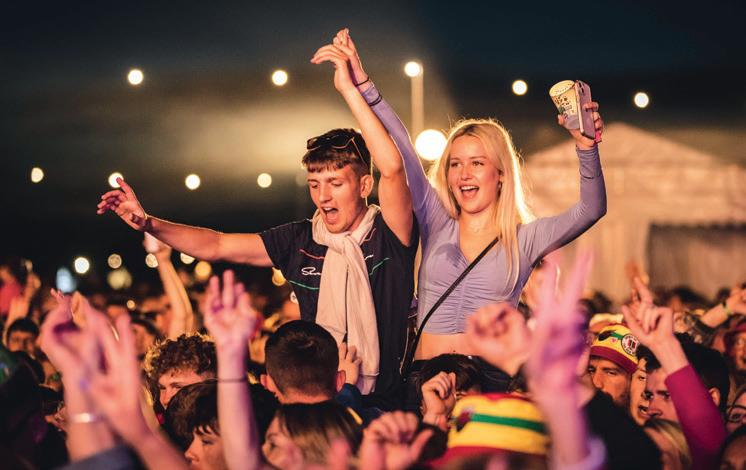

“The supply chain and availability of kit was a struggle,” Davies said. “We had companies drop out at the last minute, but we managed to source three big tops with 24 hours’ notice. Traditionally, Eisteddfod has had some big square looking marquees on site, but the thought was that big tops would introduce more colour.
“Also, we couldn’t find one supplier to provide all the toilets and showers. We were lucky that we had booked lots of our suppliers pre-COVID and kept in touch with them during the pandemic. But, for example, our toilet provider came back post-COVID and said: ‘We can’t do the job’.”
Davies was assisted on site by Llyr Jones, production manager, Mark Jones, site manager, and Miriam Plassmann, site coordinator. They worked hard to deliver the Maes in a tricky location: Pretty much in the middle of nowhere with narrow access roads. So, it was imperative that the site’s access issues were communicated to every driver and contractor in advance of the build.
Davies commented: “Because of the Eisteddfod’s location, we had more people staying on site than normal. We had almost 1,200 caravans on site, but we had to get contractors in to round off some of the corners on the road networks and do advance work on the roads. We also had to access some of the site via a school playing field so we had to wait until the school shut for the summer holidays before we could use that access point. Plus, we had to put in pedestrian bridges over streams so that visitors could access parts of the site.”

BELIEF IN THE BRAND
Approximately 6,000 cars were parked on site daily and there were 1,250 caravan pitches all with power hook ups. The festival comprised 70 generators, 60 towerlights, 36 kilometres of cabling, seven kilometres of festoon, 60 cabins/containers, 85 temporary structures (of varying sizes and types), 9,250 metres of heras, 4,250 metres of pedestrian barrier, and 3,100 trackway panels.
Davies continued: “One other consideration this year was the proximity of the site to built up residential areas. It was a lot closer than in previous years. We spent a fair amount of time working with local authority regulatory services and Acoustics and Noise, our independent noise consultant, as well as looking at types and direction of PA systems. We utilised cardioid subs and we also had to consider the noise of generators, which were running for 24 hours, and the noise vehicles made when driving along the trackway.”
But what stood out about Eisteddfod 2022? “A lot of people come to the event, but people come for different things,” said Davies. “Some come for the live music, and some come to watch the competitions and don’t step in front of the outdoor stage. The event attracts a wide variety of people and that’s just great.”
Moses concurred. She concluded: “After three years of no live event, I learned that if you build it, they will come. As you walked across the site, you could see so many happy faces and so I know there’s belief in the brand. Now, we must go back to the drawing board and start planning for 2023. Eisteddfod is local, it’s regional, it’s national, and it’s international; we have to showcase the area and our new location each year and also appeal to an international audience. And, if you stand still, you get stale.”
SUPPLIERS LIST
Temporary structures – Neptunus, Albion Woods, Event in a Tent, Smiddereens, Absolute Marquees, YesTents, Intents, Afon Events, A&M Marquees, and LPM Bohemia Accommodation – Bunkabins Traffic management – JTM Signs Buggies – Ace Plant Hire Power and outdoor stage lighting – Figure of Eight Sound - AB Acoustics Temporary flooring - EFS Europe Trackway and pedestrian bridges – Sunbelt Rentals Fire Equipment - Snowdonia Fire and Safety HVAC - Watkins Hire Flags - A&E Adventures Main Pavilion Lighting - ELP Toilets – A1, Algeco, Event Clean, and Kanga Loos Radios – 2CL Security – Diogel Security and Collective Crowd Management Fencing – Generation Hire and Steelshield Furniture – City B Group, GFH and Xav-Eight Chalets – Chalet Events and Event Men Staging – H Events and Steeldeck Waste – Event Clean
Just the ticket
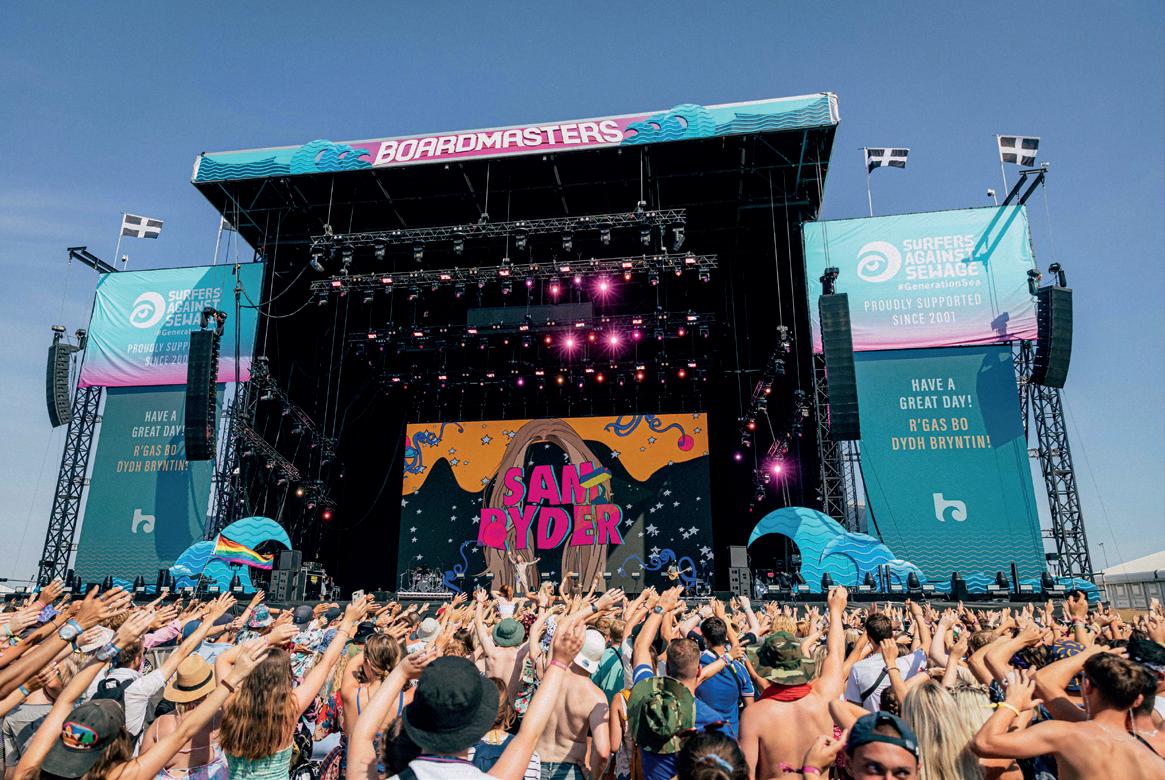
Several organisers are implementing new ticketing systems in a bid to streamline processes, increase efficiencies, and connect with their audiences. The sector talks
Lakefest has partnered with MetaFests, a Web 3 services specialist, and NFT ticketing marketplace, SeatLabNFT, to become the first music festival to fully switch to next-generation NFT tickets for all attendees in 2023.
Lee Martin, Lakefest’s founder and director, has appointed MetaFests to harness emerging NFT and blockchain opportunities for the festival, which celebrated its 10th edition at Eastnor Castle this year.
MetaFests has an exclusive partnership with UK-based SeatLabNFT to provide NFT ticketing and merchandising technology that enables fans to enjoy a “more immersive, connected festival experience”. The festival’s 2023 edition will be entirely ticketed using this new technology with tickets going on sale in early September.
Martin said that the new move will enable more effective connections with the Lakefest audience. Plus, he said it will streamline operations and harness new revenue streams, which is great timing, as the festival wishes to increase capacity in 2023 from 15,000 to 20,000.
GAIN CONTROL
All Lakefest ticketholders will receive an NFT wallet, a kind of digital interface with the event, to purchase and store their ticket. To elevate the ticketing experience further, everyone who purchases a ticket will receive a digital collectable to recognise and reward their attendance, with an item that can be traded amongst collectors long after the festival has finished. For example, festivalgoers could also use them to redeem on-site perks such as VIP upgrades, merchandise, food, drink, or meet-and-greets.
According to Martin, NFT ticketing gives the organising team greater control. Blockchain tech eliminates the risk of ticketing fraud, with organisers able to gain control over primary and secondary ticket sales.
FRESH THINKING
Zac Leigh, co-founder of Tixel, the ticket resale marketplace, believes that organisers which are thinking differently about ticket pricing, ticket rules, communication, selling periods, and marketing are standing out. Those organisers which have adopted fresh thinking are the ones making headway.
Leigh continued: “The sales cycle for events across the board is wildly different these days. People are generally choosing to keep their options open by buying tickets much closer to the event. And as for ‘early birds’,” we can’t take them for granted – buying a ticket these days is more of an option than a commitment, and there’s no guarantee they will attend.”
COVID showed consumers that they could expect a whole lot more flexibility in their purchases, such as flexible policy changes. The most proactive ticketers and event producers have followed suit and built more flexibility into their offerings to cater to this new consumer.
This year, Tixel’s SafeScan technology was implemented at Boardmasters, El Dorado, and End of the Road to allow tickets to be validated and re-issued on the back-end prior to actual tickets being issued. This enabled ticket trading between festivalgoers to take place easily and safely. Plus, the company worked with 2000trees, Silverstone Woodlands, and ArcTanGent, as well as NASS and Bournemouth 7s.
ArcTanGent, El Dorado, and End of the Road were new contracts for Tixel. 2022 was certainly a busy year, as several organisers chose to look at their ticketing processes and contractors. Underneath the Stars and The Classic at Silverstone appointed new ticketing suppliers, National Ice Centre rolled out Halo V2 ticket scanning, and Blackpool’s Winter Gardens appointed Mediaworks to help move all its ticketing operations in-house.
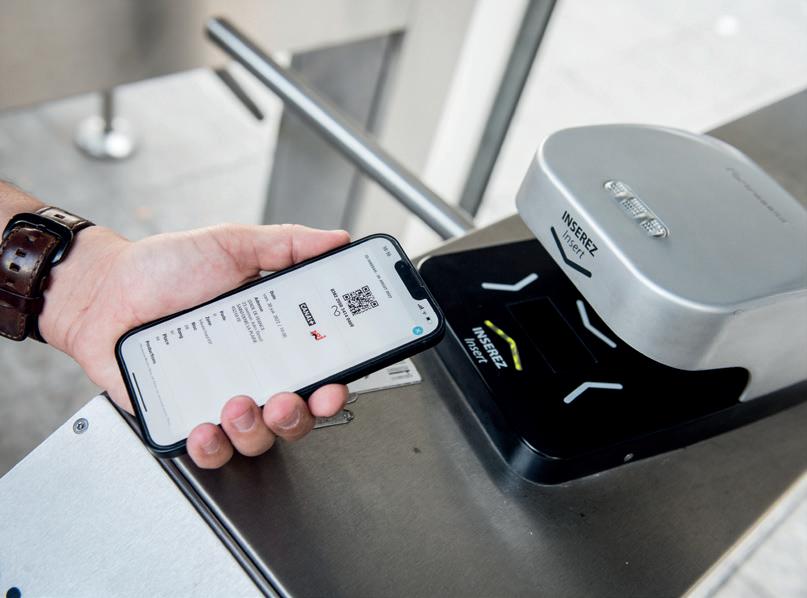
DAVID HORNBY


TAILORED TICKETING
Whilst End of the Road chose to work with Tixel on ticket resale, the organising team also opted to work with TicketSellers, which provided a tailored ticketing and onsite gate management system.
Rhys Cadogan, commercial director at TicketSellers, said: “TicketSellers has invested heavily in its on-site operations, including new equipment that allows us to provide the quickest possible ingress solutions. We have also increased our pool of talented operators, managers, and tech experts. 2022 has seen an outcry for talented staff and experience. This investment sees TicketSellers strengthen its position as the leading provider for on-site deployment and experience.”
The ticketing specialist also supplied the independent festival, Secret Garden Party, with ticketing services. Cadogan continued: “Being members of the Association of Festival Organisers and proud supporters of the Association of Independent Festival, TicketSellers has always had independent festivals at its core and has an established position as the ticket agent of choice for many independents. TicketSellers was chosen by Secret Garden Party for its experience within this sector and its understanding of its complexities.”
DATA AND DIGITAL EXPERIENCE
According to David Hornby, Secutix managing director for Northern Europe, UK and Ireland, demand for digital ticketing is increasing. Organisers recognise that the switch from paper to smartphone tickets can solve many of the problems facing the industry, from ticket touts to security. But there’s also a desire for digital engagement.
“Organisers want to digitally engage with audiences, guarantee safe venue operations, and create a secure and fairer way for customers to buy and sell tickets,” Hornby explained. “Digital ticketing is helping them to address all of these.”
Secutix recently worked with the Royal Edinburgh Military Tattoo 2022. After two years of cancelled events due to the pandemic, The Royal Edinburgh Military Tattoo came back in August with a bold and exciting vision for the future. Secutix’s tech solutions were deployed to ensure a smooth ticketing experience.
Hornby added: “The organisers wanted a new ticketing technology partner that could help them achieve their ambitions both domestically and internationally, get closer to their guests through data and continue to deliver the best possible customer experience.”
Secutix’s mobile ticketing solution, TIXNGO, delivered secure digital tickets through a new Tattoo app. This was the first time the event used secure mobile digital ticketing.
“Our S-360 platform featured a 3D interactive seat map allowing guests to view, compare and choose their seats using a virtual, 360-degree panoramic view of the iconic Edinburgh Castle Esplanade,” Hornby commented. “The platform sold the new five-tier membership scheme, hospitality packages, and, as a registered charity, processed charitable donations to the Tattoo.”
Hornby believes that organisers could give more consideration to ongoing relationships with audiences. For example, organisers could connect more and beyond the live experience. He advised: “What can you do with older content, how can you use streaming services, could you put
LEE MARTIN

ZAC LEIGH
content behind a paywall and monetise it during the period between the live events? Organisers need to start thinking about building a hybrid digital experience.
“Also, sell early. I’m surprised that more event organisers don’t sell tickets earlier. There are still those who will finish their event, take a break, come back, start planning next year’s content and then think about going on sale. My advice is to leverage the moment. Start to build your audience for next year’s event based on this year’s performance rather than start from scratch later on.”


